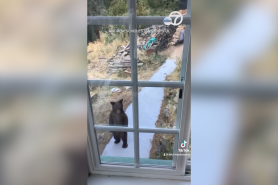

After repeated protest from animal rights activists, Miami Seaquarium has agreed to release its captive orca, Lolita, into the wild waters of the Pacific Northwest.
Videos by Outdoors
Lolita has been a member of Miami Seaquarium for about 50 years. She was captured in the wild when she was four years old. At the time, she was name Toki, reports NPR. She was later renamed Lolita and shipped to Florida to take part in trained animal shows.
Over the past few decades, wildlife advocates have spoken out about Lolita’s captivity. Like many marine mammals, killer whales are highly intelligent. Keeping such creatures in enclosures is a moral wrong, activists say. Other institutions, like the soon-to-be-built octopus farm in Spain, have drawn similar fire in recent years.
Orca whales, which are actually part of the dolphin family, may be especially sensitive to the conditions of captivity. In the wild, their territories span many miles of open ocean—far more space than the average aquarium tank can provide. Captive orcas have been known to lash out against their handlers. In 2010, for example, an orca named Tilikum drowned his trainer after a show at Sea World by grabbing her ponytail and dragging her to the bottom of the pool. Many experts saw this behavior as a response to chronic stress and depression.
Though the aquarium has promised to release Lolita, a few obstacles remain. For one thing, there’s the expense. Miami is thousands of miles from the Pacific Ocean. Shipping an orca that distance will likely be very pricey, reports NPR, and the funding details are still being worked out. For another, there’s Lolita’s age.
Lolita is currently 57 years old, making her the oldest orca currently kept in captivity. Female orcas usually live to be 50 to 60 years old in captivity and 45 to 50 years old in the wild. So, even if Lolita is successfully transported to the Pacific, there’s no guarantee that she’ll be fit enough to survive for very long.
Despite the risks, Florida biologists and animal rights activists are applauding the decision. Miami Seaquarium signed an agreement with advocacy group Friends of Lolita this week to make their promise official.










1. Transport is not only pricey – but incredibly stressful to this already geriatric Orca! The trip alone might kill her. It certainly won’t be setting her up for a strong re-entry into the Pacific.
2. Will she put in aquarium out there to adjust before release? Is this a good time of year to connect with pod?
If it is her last days, I would rather they be spent in the free wide world with her pod/family, versus alone in that stagnant, algae filled pool they have her in. It’s past time we let her go, even if it is for a short time only. Would you rather die Alone ? If you were kidnapped as a child, abused for over 50 years, want to die there ? Or have a day, week, a month or year with your family ? It’s time for her to go home. To hear her family again in free waters, even for a moment. All any of us have is moments. She deserves hers for what we have done to her.
Pingback: Dolphins Are Beaching Themselves in Japan And No One Knows Why – Outdoors.com